-
Martian Methane Reveals the Red Planet is not a Dead Planet

A team of NASA and university scientists has achieved the first definitive detection of methane in the atmosphere of Mars. This discovery indicates the planet is either biologically or geologically active.Source: [NASA]
-
A Banner Year for Astrobiology in Discover Magazine's Top 100 Stories of 2008
NAI-funded research confirming the presence of extraterrestrial nucleobases within the Murchison meteorite featured squarely in the middle of Discover’s annual Top 100 list, coming in at number 50. Researchers from NAI’s NASA Goddard Space Flight Center Team contributed to the remarkable study, the results of which imply that the building blocks of life could be widespread throughout the universe. Other stories of astrobiological significance anchored the list on both ends: the confirmation of water ice on Mars by NASA’s Phoenix lander—number 6; and the detection of hydrocarbons in the icy jets of...
-
Astrobiology Summer Science Experience for Teachers (ASSET)
ASSET, produced by the SETI Institute, is a science and curriculum institute for high school science teachers focused on the 9th grade curriculum, Voyages Through Time. The ASSET experience, held at San Francisco State University from 15-20 June 2009, will be intense and exciting, interactive and content rich, with presentations by leading astrobiology researchers from the SETI Institute, NASA, and California Academy of Sciences. Participants receive a copy of VTT. All expenses are covered by grant funds. Applications accepted January 5 – February 20, 2009.
-
NAI Scientist Elected AAAS Fellow
Please join NAI in congratulating Jim Elser of the new Arizona State University (ASU) Team on his election as Fellow of the American Association for the Advancement of Science (AAAS). He and the other newly elected fellows will be recognized Feb. 14 at the Fellows forum, during the 2009 AAAS annual meeting in Chicago.
Becoming a Fellow is in recognition of efforts toward advancing science applications that are deemed scientifically or socially distinguished. Within that general framework, each awardee is honored for contributions to a specific field.
Elser is cited by AAAS for “pioneering...
Source: [Arizona State University Press Release]
-
Follow the Elements
New research funded by the NASA Astrobiology Institute is providing insight into how the distribution of elements in Earth’s oceans has affected the evolution of life over time. The research sheds light on how the biosphere of Earth has changed alongside the planetary environment, and will help astrobiologists understand the conditions necessary for life on other planets.
Source: [Astrobiology Magazine]
-
Elements and Evolution
New NAI PI Ariel Anbar of Arizona State University has published a Perspectives piece in Science this week relating the presence of bioessential elements to the evolution and distribution of life on Earth, especially in the oceans.
-
Extreme Science on Earth's Highest Lakes

This past October 29th, Nathalie Cabrol and her team traveled to the highest volcanic lakes in the world to continue her work on the NAI funded High Lakes Project (HLP). This is the 6th year of the project and they are, right now, busy collecting data to characterize the response of these lakes to climate variability in one of the best terrestrial environmental analogs to early Mars.
To share in the ongoing adventure, see this project’s blog, read up on the science and enjoy some great pictures.
Source: [High Lakes 2008]
- Extreme Science on Earth's Highest Lakes
- New NAI Team at RPI Launches New York Center for Astrobiology
- 1/12 FAR Seminar: Habitability
- New Astrobiology Careers Section Added to NAI Website
- Recently Published Research from the NAI
- NAI - Nordic Summer School: “Water, Ice and the Origin of Life in the Universe”
- AbGradCon 2009
- 2009 Research Experiences for Undergraduates (REU) Program in Astrobiology
- NASA Ames Academy for Space Exploration
- Student Opportunities at NASA Centers
- ROSES-08 Amendment 33: Additional Proposal Opportunity for ROSES Education and Public Outreach Supplemental Awards
- ROSES-08 Amendment 32: Final text for Moon and Mars Analog Mission Activities (MMAMA)
- Senior Staff Scientist Position at the Lunar and Planetary Institute
- Solar-Extrasolar Meeting to be held as NASA Ames Research Center
- Scientific Problem-Solving Benefits from Open Collaboration
 December 19, 2008
December 19, 2008 

